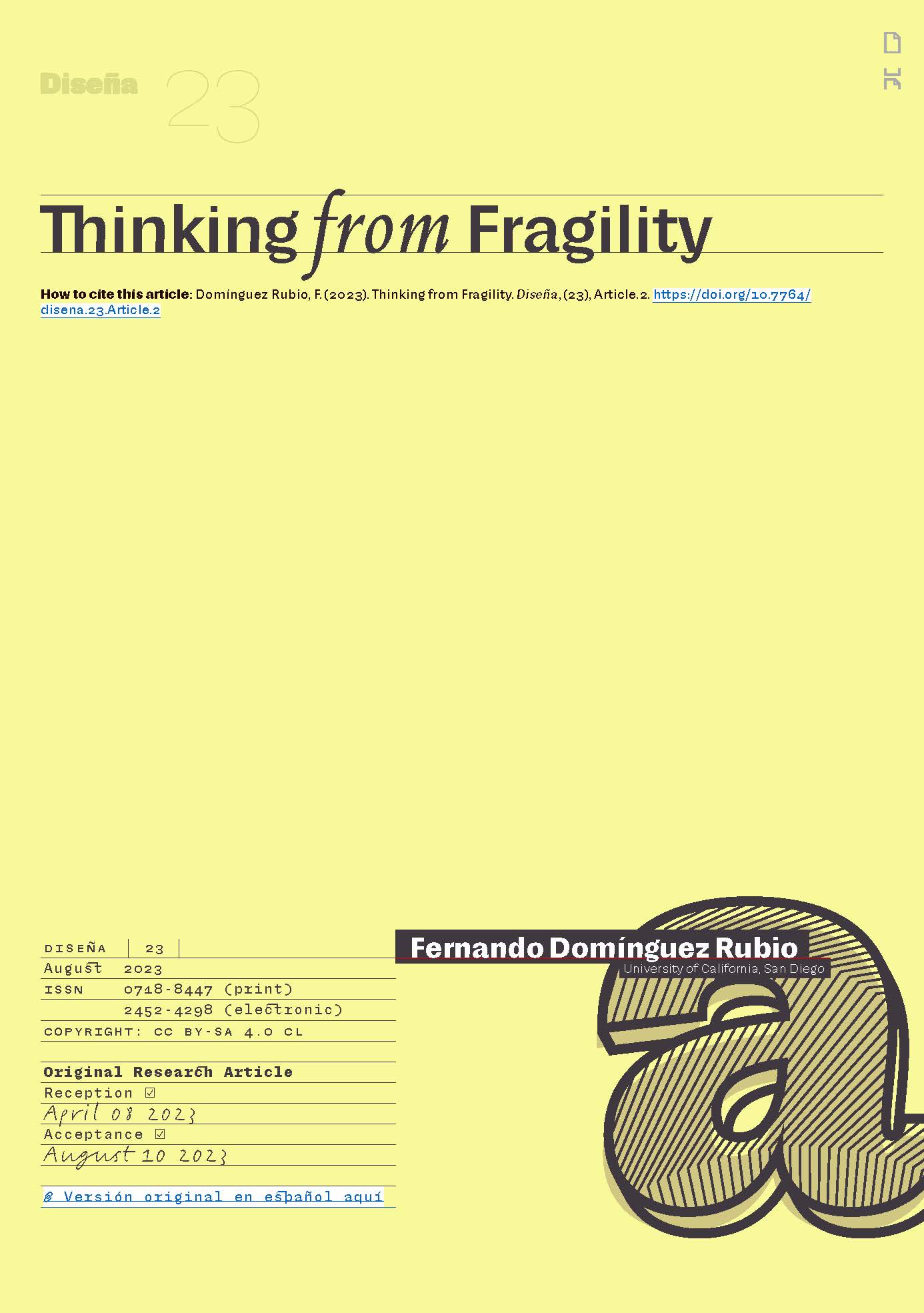Thinking from Fragility
Main Article Content
Abstract
The purpose of this article is to claim the need to re-imagine contemporary ethical and political vocabularies from a radical recognition of―and confrontation with― fragility. More specifically, this article seeks to highlight the importance of cultivating an awareness of those moments when bodies, objects, and the worlds we inhabit begin to crack and reveal their fragility; and the relevance of recovering these moments as spaces from which to open up alternative ways of thinking and imagining. On the one hand, this article will argue for the necessity of thinking from fragility, as an opportunity to rectify the arrogant refusal to think about limits that has characterized much of modern thought, which can be achieved through an attention to practices of care, repair, and maintenance. On the other hand, it will advocate for thinking from these practices as means to cultivate forms of attention to what remains after rupture, and to claim it as a space from where to imagine which ethics and politics are possible beyond collapse.
Downloads
Article Details

This work is licensed under a Creative Commons Attribution-ShareAlike 4.0 International License.

This work is licensed under a Creative Commons Attribution-ShareAlike 4.0 International license.
COPYRIGHT NOTICE
All contents of this electronic edition are distributed under the Creative Commons license of "Attribution-ShareAlike 4.0 Internacional" (CC-BY-SA). Any total or partial reproduction of the material must mention its origin.
The rights of the published images belong to their authors, who grant to Diseña the license for its use. The management of the permits and the authorization of the publication of the images (or of any material) that contains copyright and its consequent rights of reproduction in this publication is the sole responsibility of the authors of the articles.
References
Butler, J. (2016). Frames of War: When Is Life Grievable? (Reprint ed.). Verse.
Butler, J. (2020). Precarious Life: The Powers of Mourning and Violence (Reissue ed.). Verse.
Callén, B., & Criado, T. S. (2016). Vulnerability Tests. Matters of “Care for Matter” in E-waste Practices. Tecnoscienza: Italian Journal of Science & Technology Studies, 6(2), Article 2.
Chakrabarty, D. (2021). The Climate of History in a Planetary Age (1st ed.). University of Chicago Press.
de la Cadena, M. (2015). Naturaleza fuera de lo común. Simbiología. https://simbiologia.cck.gob.ar/publicaciones/naturaleza-fuera-de-lo-comun-por-marisol-de-la-cadena/
Deleuze, G. (1995). Difference and Repetition (P. Patton, Trans.; Revised ed.). Columbia University Press.
Denis, J., & Pontille, D. (2022). Le soin des choses : Politiques de la maintenance. La Découverte.
Denis, J., & Pontille, D. (2023). Cultivating Attention to Fragility: The Sensible Encounters of Maintenance. In D. Papadopoulos, M. Puig de la Bellacasa, & M. Tacchetti (Eds.), Ecological Reparation: Repair, Remediation and Resurgence in Social and Environmental Conflict (1st ed., pp. 344-361). Bristol University Press.
Domínguez Rubio, F. (2016). On the Discrepancy between Objects and Things: An Ecological Approach. Journal of Material Culture, 21(1), 59-86. https://doi.org/10.1177/1359183515624128
Dominguez Rubio, F. (2020). Still Life: The Behind-The-Scenes Struggle to Preserve Art at MoMA (1st ed.). University of Chicago Press.
Giddens, A. (1991). Modernity and Self-Identity: Self and Society in the Late Modern Age. John Wiley & Sons.
Glissant, É. (2020). Introduction to a Poetics of Diversity: By Édouard Glissant (C. Britton, Trans.). Liverpool University Press. https://doi.org/10.2307/j.ctv12pntsm
Haraway, D. J. (2008). When Species Meet. University of Minnesota Press. https://www.upress.umn.edu/book-division/books/when-species-meet
Haraway, D. J. (2016). Staying with the Trouble: Making Kin in the Chthulucene (1a ed.). Duke University Press.
Hartman, S. (2019). Wayward Lives, Beautiful Experiments: Intimate Histories of Riotous Black Girls, Troublesome Women and Queer Radicals (1st ed.). W. W. Norton & Company.
Jackson, S. J. (2014). Rethinking Repair. In T. Gillespie, P. J. Boczkowski, & K. A. Foot (Eds.), Media Technologies: Essays on Communication, Materiality, and Society. MIT Press. https://doi.org/10.7551/mitpress/9042.003.0015
Jackson, S. J., & Houston, L. (2021). The Poetics and Political Economy of Repair. In J. Swartz & J. Wasko (Eds.), Media: A Transdisciplinary Inquiry (pp. 244-264). University Of Chicago Press.
Jackson, S. J., & Kang, L. (2014). Breakdown, Obsolescence and Reuse: HCI and the Art of Repair. Proceedings of the SIGCHI Conference on Human Factors in Computing Systems, 449-458. https://doi.org/10.1145/2556288.2557332
Latour, B. (2017). Facing Gaia: Eight Lectures on the New Climatic Regime (C. Porter, Trans.; 1st ed.). Polity.
Mackenzie, C., Rogers, W., & Dodds, S. (Eds.). (2014). Vulnerability: New Essays in Ethics and Feminist Philosophy. OUP USA.
Mbembe, A. (2019). Necropolitics. Duke University Press.
McRuer, R. (2006). Crip Theory: Cultural Signs of Queerness and Disability. NYU Press.
Moore, J. W. (2016). Anthropocene or Capitalocene?: Nature, History, and the Crisis of Capitalism (1st ed.). PM Press.
Murphy, M. (2015). Unsettling Care: Troubling Transnational Itineraries of Care in Feminist Health Practices. Social Studies of Science, 45(5), 717-737. https://doi.org/10.1177/0306312715589136
Pignarre, P., & Stengers, I. (2021). Capitalist Sorcery: Breaking the Spell (1st ed.). Palgrave Macmillan UK (Original work published 2007).
Puig de la Bellacasa, M. (2017). Matters of Care: Speculative Ethics in More than Human Worlds (3rd ed.). University of Minnesota Press.
Quijano, A. (1999). Colonialidad del poder, cultura y conocimiento en América Latina. Dispositio, 24(51), 137-148.
Rafanell i Orra, J. (2015). Fragmentar el mundo. Melusine.
Real Academia Española, & Asociación de Academias de la Lengua Española. (n.d.). Frágil. Diccionario de la lengua española (300th anniversary ed.). https://dle.rae.es/
Serres, M. (1995). The Natural Contract (Illustrated ed.). University of Michigan Press.
Stengers, I. (2015). In Catastrophic Times: Resisting the Coming Barbarism. Open Humanities Press.
Strebel, I., Bovet, A., & Sormani, P. (2019). Repair Work Ethnographies: Revisiting Breakdown, Relocating Materiality (1st ed.). Palgrave Macmillan.
Tsing, A. L., Bubandt, N., Gan, E., & Swanson, H. A. (2017). Arts of Living on a Damaged Planet: Ghosts and Monsters of the Anthropocene (3rd ed.). University of Minnesota Press.
Wynter, S. (1994). “No Humans Involved” An Open Letter to My Colleagues. Forum N.H.I: Knowledge for the 21st Century, 1(1), 1-17.

